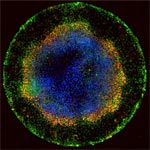This page is historical material reflecting the Feedback Loop Blog as it existed on
November 13, 2014. This page is no longer updated and links to external websites
and some internal pages may not work.
November 13, 2014
As seen under a microscope, human embryonic cells (colored dots) confined to circles measuring 1 millimeter across start to specialize and form distinct layers similar to those seen in early development. Credit: Aryeh Warmflash, Rockefeller University. View larger image
Each fluorescent point of light making up the multicolored rings in this image is an individual human embryonic cell in the early stages of development. Scientists seeking to understand the molecular cues responsible for early embryonic patterning found that human embryonic cells confined to areas of precisely controlled size and shape begin to specialize, migrate and organize into distinct layers just as they would under natural conditions.
Read the
Inside Life Science article to learn more about this research, which has opened a new window for studying early development and could advance efforts aimed at using human stem cells to replace diseased cells and regenerate lost or injured body parts.


